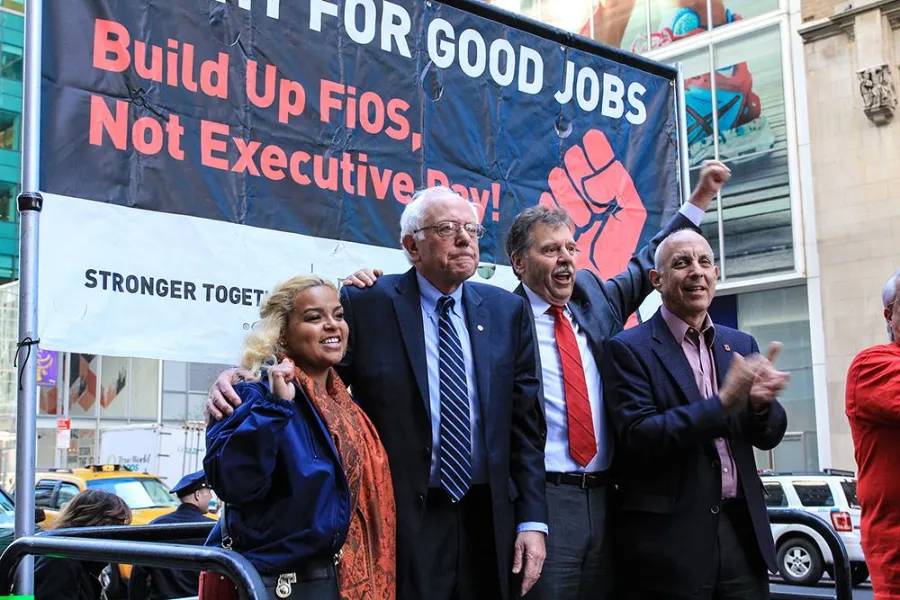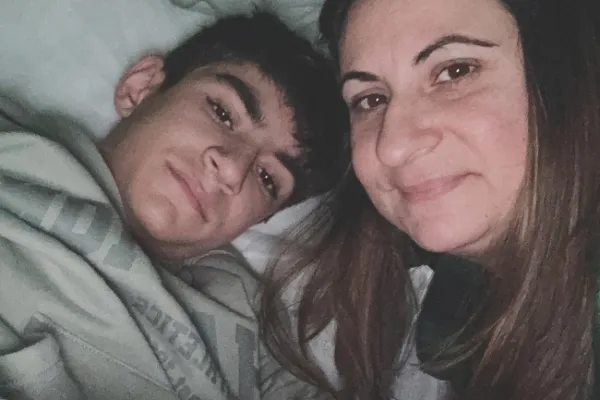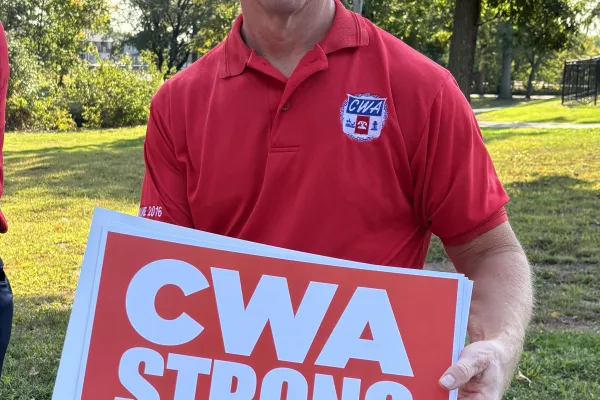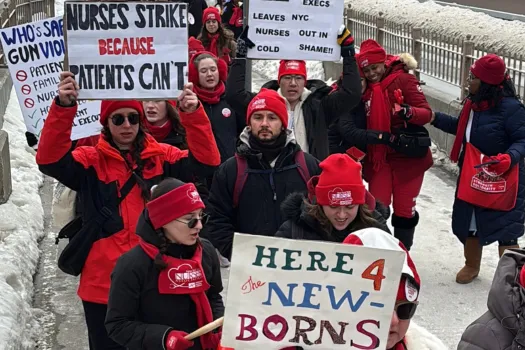Feds Slap Verizon With Labor Complaint

BREAKING: Fed Gov't has slapped Verizon w/ labor complaint for firing Bianca: https://t.co/dBmgphIVMK#StandUp2Vzpic.twitter.com/rpsZpUTDzD
— CWA District 1 (@CWADistrict1) November 18, 2015
The Federal National Labor Relations Board (NLRB) has concluded that Verizon Wireless illegally fired CWA Local 1109 member Bianca Cunningham. The company had attempted to silence and terrify Brooklyn Verizon Wireless workers when they fired her from her job at the Retail Store in Bensonhurst, Brooklyn earlier this year.
“Verizon makes almost a billion and a half dollars a month in profit,” said Dennis Trainor, Vice President of CWA District One. “But instead of settling a fair contract for retail workers who make about 300 times less than the company’s CEO, management tries to intimidate its workers by threatening to fire their leader for standing up for her rights. Now that the Federal government has stepped in, Verizon should bring Bianca back and settle fair and just contracts.” The 65 newly-unionized Brooklyn workers are the first retail workers in all of Verizon Wireless to form a union. Management is also targeting other union activists. Verizon Wireless workers are fighting for raises, better benefits and a voice on the job to improve working conditions and protect themselves against unfair metrics that drive commissions and management favoritism. Background 39,000 workers are currently working without a contract at Verizon. Fortune Magazine ranked Verizon the 15th largest corporation in America in 2014. On October 20, Verizon reported profits of $4.2 billion in 3Q 2015 on revenues of $33.2 billion. This is on top of $8.6 billion in the first half of 2015. The company also reported that during the first nine months of 2015 it has paid out nearly $6.4 billion to shareholders in dividends and stock buybacks. Over the last five years, Verizon has paid its top five executives $249 million. At Verizon Wireless, CWA represents about 100 long-time unionized technicians in New York State and 75 retail employees in Brooklyn and Everett, MA. The 65 Brooklyn workers are the first retail workers to form a union in Verizon Wireless and are seeking a fair first contract. Management is refusing to offer any raises, benefits or improvements to working conditions at the bargaining table for the Brooklyn workers (and also newly-unionized Everett, Massachusetts workers). Verizon Wireless is also refusing to offer fair raises, benefit increases or other improvements for its technicians, who are now working without a contract. Any improvements for the newly-union retail workers would set a precedent for the entire company. Bianca Cunningham is the leader of the Brooklyn Verizon Wireless workers. Firing her is an attempt to intimidate the other retail workers. A damning audit of Verizon’s FiOS rollout in New York City found that Verizon has failed to meet its promise to deliver high-speed fiber optic internet and television to everyone in the city who wanted it. During its negotiations for a city franchise, Verizon promised that the entire city would be wired with fiber optic cables by June 2014 and that after that date, everyone who wanted FiOS would get it within six months to a year. The audit found that despite claiming that it had wired the whole city by November 2014, Verizon systematically continues to refuse orders for service. The audit also found that Verizon stonewalled the audit process. In addition, rates for basic telephone service have increased in recent years, even as Verizon has refused to expand their broadband services into many cities and rural communities, and service quality has greatly deteriorated. Verizon’s declining service quality especially impacts customers who cannot afford more advanced cable services, or who live in areas with few options for cable or wireless services. In 2005, New York’s Public Service Commission (PSC) eliminated automatic fines for Verizon’s telephone service quality failures, reasoning that “competition” would improve services. Instead, service quality plunged. In the 3rd quarter of 2010, Verizon cleared only 1.2% of out of service complaints within 24 hours, almost 79 percentage points lower than the PSC’s 80% requirement. Rather than reverse course, the PSC changed its measurements, cutting out 92% of customers from service quality measurements and consolidating 28 repair service bureaus into 5 regions. On paper, terrible service quality was almost miraculously transformed. In reality, service quality continued to decline.In late October, Presidential candidate Bernie Sanders called on Verizon to re-hire Ms. Cunningham and settle the contract with Verizon and Verizon Wireless workers.
“Verizon makes almost a billion and a half dollars a month in profit,” said Dennis Trainor, Vice President of CWA District One. “But instead of settling a fair contract for retail workers who make about 300 times less than the company’s CEO, management tries to intimidate its workers by threatening to fire their leader for standing up for her rights. Now that the Federal government has stepped in, Verizon should bring Bianca back and settle fair and just contracts.”
The 65 newly-unionized Brooklyn workers are the first retail workers in all of Verizon Wireless to form a union. Management is also targeting other union activists.
Verizon Wireless workers are fighting for raises, better benefits and a voice on the job to improve working conditions and protect themselves against unfair metrics that drive commissions and management favoritism.
Background:
39,000 workers are currently working without a contract at Verizon. Fortune Magazine ranked Verizon the 15th largest corporation in America in 2014. On October 20, Verizon reported profits of $4.2 billion in 3Q 2015 on revenues of $33.2 billion. This is on top of $8.6 billion in the first half of 2015. The company also reported that during the first nine months of 2015 it has paid out nearly $6.4 billion to shareholders in dividends and stock buybacks. Over the last five years, Verizon has paid its top five executives $249 million.
At Verizon Wireless, CWA represents about 100 long-time unionized technicians in New York State and 75 retail employees in Brooklyn and Everett, MA. The 65 Brooklyn workers are the first retail workers to form a union in Verizon Wireless and are seeking a fair first contract. Management is refusing to offer any raises, benefits or improvements to working conditions at the bargaining table for the Brooklyn workers (and also newly-unionized Everett, Massachusetts workers). Verizon Wireless is also refusing to offer fair raises, benefit increases or other improvements for its technicians, who are now working without a contract. Any improvements for the newly-union retail workers would set a precedent for the entire company. Bianca Cunningham is the leader of the Brooklyn Verizon Wireless workers. Firing her is an attempt to intimidate the other retail workers.
A damning audit of Verizon’s FiOS rollout in New York City found that Verizon has failed to meet its promise to deliver high-speed fiber optic internet and television to everyone in the city who wanted it. During its negotiations for a city franchise, Verizon promised that the entire city would be wired with fiber optic cables by June 2014 and that after that date, everyone who wanted FiOS would get it within six months to a year. The audit found that despite claiming that it had wired the whole city by November 2014, Verizon systematically continues to refuse orders for service. The audit also found that Verizon stonewalled the audit process.
In addition, rates for basic telephone service have increased in recent years, even as Verizon has refused to expand their broadband services into many cities and rural communities, and service quality has greatly deteriorated. Verizon’s declining service quality especially impacts customers who cannot afford more advanced cable services, or who live in areas with few options for cable or wireless services.
In 2005, New York’s Public Service Commission (PSC) eliminated automatic fines for Verizon’s telephone service quality failures, reasoning that “competition” would improve services. Instead, service quality plunged. In the 3rd quarter of 2010, Verizon cleared only 1.2% of out of service complaints within 24 hours, almost 79 percentage points lower than the PSC’s 80% requirement. Rather than reverse course, the PSC changed its measurements, cutting out 92% of customers from service quality measurements and consolidating 28 repair service bureaus into 5 regions. On paper, terrible service quality was almost miraculously transformed. In reality, service quality continued to decline.
Contact: Michael Rabinowitz-Gold, 646-342-3469, [email protected] CJ Macklin, 646-335-0718, [email protected]
Local 1180 Member Searches for Kidney Donor to Save Her Son
From the Desk of the Assistant to the Vice President of CWA District 1
10,000 New York State Nurses Association Members Win Strike in NYC; 5,000 More Press On, Entering Week Five


